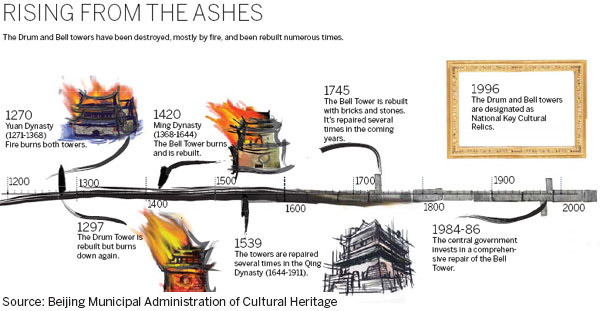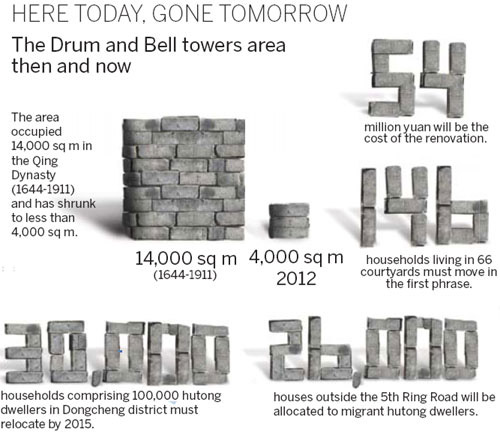
 'Taken 2' grabs movie box office crown
'Taken 2' grabs movie box office crown
 Rihanna's 'Diamonds' tops UK pop chart
Rihanna's 'Diamonds' tops UK pop chart
 Fans get look at vintage Rolling Stones
Fans get look at vintage Rolling Stones
 Celebrities attend Power of Women event
Celebrities attend Power of Women event
 Ang Lee breaks 'every rule' to make unlikely new Life of Pi film
Ang Lee breaks 'every rule' to make unlikely new Life of Pi film
 Rihanna almost thrown out of nightclub
Rihanna almost thrown out of nightclub
 'Dark Knight' wins weekend box office
'Dark Knight' wins weekend box office
 'Total Recall' stars gather in Beverly Hills
'Total Recall' stars gather in Beverly Hills
Building new lives
Updated: 2012-03-29 09:38
By Cheng Anqi, Zhang Zixuan and Han Bingbin (China Daily)
|
||||||||
Li says her mother recently died after moving into a high-rise. She blames the lack of exercise that came with her new housing.
Her family believes a massive renovation, rather than relocation, of the residential areas would help residents. But the government has so far only pressed for relocations rather than offer to renovate, and it also forbade residents from improving their properties, Li says.
Retired bus driver Bai Changyong has religious reasons for not wanting to live far away. He and his father worship at the nearby Deshengmen Mosque.
Moving away would tear them from the city's Muslim community. About 2,000 Muslims are concentrated near the city's center.
"It would be really hard for us to move away from our community. We'd hate to leave the halal food areas. Pork is the preferred meat in the rest of the city's butcher shops."
Bai believes developers will build new courtyards to sell to the rich.
Zhang Jiayu believes relocating would place financial strain on the neighborhoods' residents.
"Hutong dwellers don't have deep pockets," the 56-year-old says.
Just a few blocks southeast is the Heizhima Hutong Elementary School, a reputable 89-year-old public school where many parents compete for a seat for their children by offering "out-of-district fees" of at least 50,000 yuan ($7,904).
"We don't have to pay the fees because we live in the district. The school is a 10-minute walk for my granddaughter. What could be more convenient?" he says.
And Zhang's house is a two-minute walk from the Gulou Hospital of Traditional Chinese Medicine, where Zhang's 90-year-old father was snatched from the jaws of death.
Timing was everything when his father developed a brain infection.
"We need to live close to the hospital. No one can be certain there will be the same service in the new place."
He points out Beijing's gridlock often causes a drag on emergency vehicle response times.
And moving would transform their lifestyles.
Zhang walks his bird in a cage every day because he loves the excitement of neighbors' mahjong rounds.
"I don't play but love to interact with neighbors," he says. "I don't think I'll get to see it anymore after we move into a high-rise."
While four generations occupy his two-story, 50-sq-m traditional home in Zhongluowan Hutong, moving into a larger home isn't better, he says.
For the first of the three phases, Li Xiangyu's home - shared by her husband, daughter and son-in-law - on Tanggong Hutong is safe.
But she believes the demolished area will be turned into new courtyards, and green and parking areas that will expel the locals who have lived there for generations to create luxury residences for wealthy outsiders.
She hopes to see a renovation.
Her daughter and son-in-law don't like using the public toilet. And the narrow roads are always crammed with tourism buses, which makes going out "scary".
Her father died defending his house from demolition elsewhere years ago.
"Every demolition takes human lives," she says. "It is not only houses that are torn down but also family bonds."
Erik Nilsson contributed to this story.
Most Viewed
Editor's Picks

|

|

|

|

|

|
Today's Top News
Health new priority for quake zone
Xi meets US top military officer
Japan's boats driven out of Diaoyu
China mulls online shopping legislation
Bird flu death toll rises to 22
Putin appoints new ambassador to China
Japanese ships blocked from Diaoyu Islands
Inspired by Guan, more Chinese pick up golf
US Weekly

|

|








